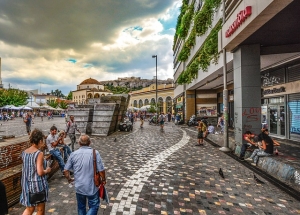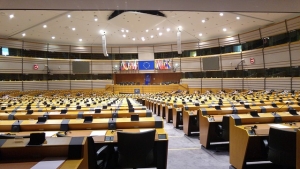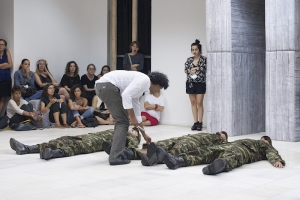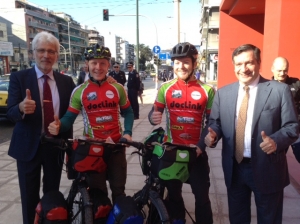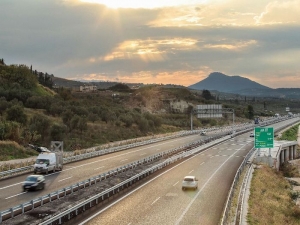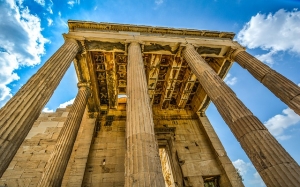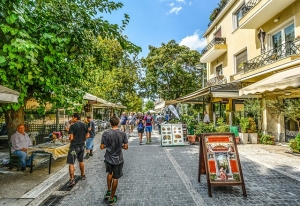BUSINESS CENTRE
XpatAthens
Thursday, 23 March 2017 07:56
How Well Do You Know Your Greek Alphabet?
It's all greek to me - how well do you know your greek alphabet? This is a fun quiz to see how well you know the Greek alphabet. See if you can get 12 out of 12!
Please visit Buzzfeed to take the quiz.
Published in
Local News
Tagged under
Monday, 27 March 2017 07:00
Stunning Photos By Athens-Based Photographer Showcase Greece Under The Sun
Alexandros Maragos, an Athens-based filmmaker and photographer captures stunning photos of nature around Greece and this month he is showcasing landscape photography of the natural light in Greece under the sun!
Alexandros tends to take photos for landscape photography in the 'Golden Hour' and with certain weather conditions to use the powerful impact of the sun’s golden tones to create dramatic and contrasting light.
This latest collection is of spectacular dramatic sunsets with the shadows of clouds creating images from the sunlight over the skies of Greece!
Please click HERE to see more photos from Alexandros Maragos’ collection.
Published in
Local News
Tagged under
Monday, 03 April 2017 07:00
New Pedestrian-Friendly Streets In Athens
In an effort to improve the quality of life in the city center, the City of Athens is proceeding with its scheme to revamp Athens commercial district. Two new pedestrianized streets, Vyssis and Kairi in the area of Psyrri will be accessible to Athens’ residents and visitors.
According to an announcement by the City of Athens, traffic will be diverted and drivers will be able to reach Athinas street through Mitropoleos and Karagiorgi Servias streets. Xrysospiliotissis street is now banned to cars from the junction of Praksitelous street to Vyssis street.
To read this article in full, please visit: Greek Travel Pages
Published in
Local News
Tagged under
Tuesday, 04 April 2017 07:00
European Parliament Votes To End Visa-Free Travel For Americans
The European Parliament has voted to end visa-free travel for Americans within the EU.
It comes after the US failed to agree visa-free travel for citizens of five EU countries – Bulgaria, Croatia, Cyprus, Poland and Romania – as part of a reciprocity agreement. US citizens can normally travel to all countries in the bloc without a visa.
The Commission is legally obliged to act to suspend the visa waiver for Americans, but the European Parliament or the Council of the European Union have the chance to object to the “delegated act” it uses to do so.
It was reported that the EU was considering the adoption of a US-style electronic travel permit scheme – a move that could create a new administrative hurdle for British tourists after Brexit.
Currently foreign travellers must pay a fee of $14 (£11) when they complete ESTA, an automated online system that determines their eligibility to travel to the US.
To read this article in full, please visit: Yahoo
Published in
Local News
Tagged under
Monday, 10 April 2017 07:00
Politics And Performance Take Centre Stage At Documenta 14 In Athens
For the first time, the prestigious contemporary art exhibition Documenta 14 opened in a city other than Kassel, Germany, where it has been held every five years since 1955. The two locations of Documenta are at the heart of artistic director Adam Szymczyk’s concept.
Titled Learning from Athens, the exhibition wants viewers to in fact “unlearn what we know” and to “immerse ourselves in the darkness of not knowing instead of pretending to know enough in advance,” Szymczyk said.
Set against the backdrop of Greece’s social and economic woes, displacement, colonialism, violence and protest are among Documenta 14’s central themes.
In Athens, the Documenta team is collaborating with around 40 local institutions, including the Benaki Museum, the Archaeological Museum of Piraeus, the Numismatic Museum and as the First Cemetery of Athens where the American artist Pope.L will be performing his Whispering Campaign (2016-17) in which five performers will roam the city whispering their observations to the public.
Visitors to Documenta 14 at EMST are greeted by a large container of olives titled Payment of Greek Debt to Germany with Olives and Art by Marta Minujin, an explicit reference to the Greek financial crisis.
To read this article in full, please visit: The Art Newspaper
Photo Credit: taken by Stathis Mamalakis of Sergio Zevallos’ performance, 2016
Published in
Local News
Tagged under
Tuesday, 18 April 2017 07:00
Bikers Ride From Athens To Kassel With Documenta 14 To Send Message Of Solidarity
Two 20-year-old cyclists began a trip from Athens to Kassel during the opening of Documents 14 to convey a message of art and solidarity. They will ride their bikes for 100 days, traveling a distance of about 4,000km across 14 European countries to the German city of Kassel. They will arrive just in time for the second part of the Documenta 14 show.
From Greece, the cyclists will travel through Albania, FYROM, Kosovo, Montenegro, Bosnia-Herzegovina, Serbia, Croatia, Slovenia, Hungary, Slovakia, Austria and the Czech Republic with their message of unity and tolerance.
To read this article in full, please visit: Greek Travel Pages
Published in
Local News
Tagged under
Monday, 08 May 2017 07:00
Olympia Odos Patra-Bound Highway Opens to Motorists
One of the most tedious journeys – from Athens to Patra – will now take an hour and 40 minutes following the opening of the new Olympia Odos motorway.
As a continuation of the Athens-Corinth highway, the 120km two-lane (total of four lanes) Olympia Odos was officially launched by Prime Minister Alexis Tsipras.
There are 12 new tunnels across the Corinth-Patra motorway. The PM also added that the overhaul of the Athens-Patra suburban railway was in the pipeline.
To read this article in full, please visit: Greek Travel Pages
Photo Credit: Olympia Odos
Published in
Local News
Tagged under
Monday, 15 May 2017 07:00
Athens To Host Conference On 'Innovation In The Mediterranean'
Enterprise Greece and ANIMA Investment Network have stepped up cooperation on innovation in the Mediterranean and have organized ‘The Next Society,’ a European and Mediterranean Innovation Conference this May 2017.
The conference marks the launch of ‘The Next Society,’ an initiative supported by public and private innovation, investment and economic development players with the support of the European Commission. It aims at mobilising entrepreneurs, innovators and corporate ecosystems to overcome the innovation and sustainable development challenges faced in the Mediterranean, in the North as much as in the South. ‘The Next Society’ wishes both to improve the frameworks and ecosystems and to develop the value creation and concrete solutions for a shared prosperity among the Mediterranean countries.
Thirty sectoral institutions from eleven countries, as well as companies and entrepreneurs, will have the opportunity to learn about the latest developments in innovation, to discuss aid measures, to explore possible partnerships, to draw inspiration from the achievements of others and to expand their network both in the Mediterranean and in the wider European area.
To read this article in full, please visit: Greek News Agenda
Published in
Local News
Tagged under
Tuesday, 16 May 2017 07:00
Athens Pride Festival Takes Central Syntagma Square
Athens once more is preparing to host the Athens Pride Festival, which will take place at central Syntagma Square this year. The 2017 festival will take place on June 10 under the motto “It’s Education”, aiming to raise awareness on the issues that concern the LGBTQI community in Greece, mainly the legal recognition of gender identity.
The first Athens Pride took place in June 2005 and marked the first Pride Parade through the city center and past the Hellenic Parliament during daylight hours. Since then, the Athens Pride festival has grown and in June 2014 included 20,000 people of all ages.
By delivering the message, “It’s Education”, the organizers wish to focus on the Greek word “Παιδεία” (education) and its broad meaning, which encompasses the concepts of schooling, upbringing, learning and culture cultivation.
To read this article in full, please visit: Greek Travel Pages
Published in
Local News
Tagged under
Monday, 29 May 2017 07:00
Athens Converts More Streets Into Pedestrian-Only Zones
As of May 2017, residents and visitors of Athens will find two more pedestrianized streets in the city center. Cars will no longer be able to turn left from Voreos Street to Karoris and Agathonos streets. It is reminded that vehicles are allowed to enter Athinas Street only from the streets of Mitropoleos, Karagiorgis and Sofokleous.
The streets Agathonos and Karoris (up to Voreou Street) have been pedestrianized as part of the municipality’s program to restore the ‘commercial triangle of Athens.’ The sides of the this triangle are the three main squares of the city: Omonia, Syntagma and Monastiraki.
To read this article in full, please visit: Greek Travel Pages
Published in
Local News
Tagged under




